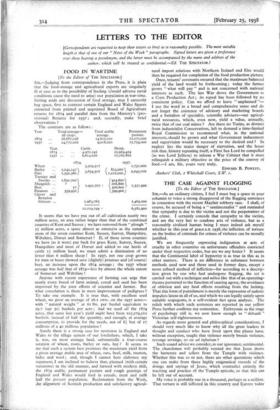LETTERS TO THE EDITOR
(Correspondents are requested to keep their letters as brief as ts reascmably possible. The most suitable - length is that of one of our " News of the Week " paragraphs. Signed letters are given a preference- over those bearing a pseudonym, and the latter 'must be accompanied by the name and address of the author, which will be treated as confidential.—Ed. THE SpECrATOR.1
FOOD IN WARTIME
[To the Editor of THE SPECTATOR.] SIR,—Judging from correspondence in the Press, it is plain that the food-storage and agricultural experts are singularly ill at ease as to the possibility of feeding (should adverse naval conditions cause the need to arise) our population in war-time. Setting aside any discussion of food storage, may I earnestly beg space, first to contrast certain England and Wales figures extracted from printed and unprinted Board of Agriculture returns for 1874 and parallel data from the Ministry's (pro- visional) Returns for 1937 ; and, secondly, make brief observations ?
The contrasts are as follows : Year. Total acreage— Total arable Permanent all crops. acreage. pasture.
1874 26,687,098 14,615,000 12,072,000 1937 24,772,000 9,018,000 15,754,000 Year.
1874 • 1937 ..
Wheat ..
Barley ..
Oats Turnips and Swedes .. Mangolds Beet Potatoes ..
Clover and Rotation Grasses .. • 1874.
2,042,147} 1,592,360 1,631,700l 57 359,950 Cattle.
4,970,545 6,614,000 3,509,317 3,634,507 { 1,991,707 1- 2,983,763 Sheep.
22,924,454 17,182,800 1937.
823,000 1,222,000 } 1424,6001
i206,800 306,600 399,900) 1,731,000 2,045,000 1,337,900 1,469,000 12,119,294+ 6,582,9oo It seems that we have put out of all cultivation nearly two million acres, an area rather larger than that of the combined counties of Kent and Sussex ; we have removed from " plough " 5 million acres, a space almost as extensive as the summed areas of the seven counties Kent, Sussex,- Surrey, Hampshire, Wiltshire, Dorset and Somerset ! If, of those seven counties we have (as it were) put back for grass Kent, Surrey, Sussex, Hampshire and most of Dorset and added to our herds of cattle ri million head, we must admit a diminution of no fewer than 6 million sheep ! In 1937, not one crop grown for man or beast showed save (slightly) potatoes and (of course) beet, an increase upon the 1874 acreage ; the- 1937 wheat acreage was half that of 1874—less by almost the whole extent of Somerset and Wiltshire !
Anyone with recent experience of farming can urge that nearly every breed of farm animal, cereal and seed has been improved by the joint efforts of scientist and farmer. But what consolation is there in mere improvement of pedigrees ? To take one example. It is true that, with excellent seed wheat, we grew an average of 16.1 cwts. on the 1937 acres— with " natural weight " at 61 lbs. per bushel equivalent to 29.7 (say 3o) bushels per acre ; had we used all the 1874 acres, that same last year's yield might have been 105,279,510 bushels, instead of half the quantity, and enough, at average consumption, to provide for the needs, not of 8} but of 17 millions of a 4o millions population !
Surely there is a strong case for reversion in England and Wales to the tillage system of our forefathers, which, I take it, was, on most average land, substantially a four-course rotation of wheat, roots, barley or oats, hay ? It seems to me that such a system best promises the maximum yield from a given average arable area of wheat, oats, beef, milk, mutton, hides and wool ; and, though I cannot here elaborate my argument; I am inclined to believe that, planned (with certain variations) in the old manner, and farmed with modern. skill, the 1874 arable, permanent pasture and rough grazings of England and Wales would feed in cereals, meat and milk half the present population. Reclamation from the Wash, the alignment of Scottish production and satisfactory agricul-
tural import relations with Northern Ireland and Eire would then be required for completion of the food production picture.
Once, tenants' covenants ensured that the maximum balanced yield of the land would be forthcoming ; today the farmer grows " what will pay " and is not concerned with national interests as such. The last War drove the Government to a Corn Production Act ; its repeal has been followed by no consistent policy. Can we afford to leave " unplanned "- I use the word in a broad and comprehensive sense and do not forget the existence of advisory and marketing boards and a battalion of specialist, scientific advisers—our agricul- tural resources, which, even now, yield a value, annually, twice that of our coal mines ? Are there no Tories, as distinct from industrialist Conservatives, left to demand a time-limited Royal Commission to recommend what, in the national interests, should be grown and what Government inducement and supervision would be necessary to the desired end ? In neglect lies the major danger of starvation, and the lesser risk that, history repeating itself, a First Sea Lord be compelled (as was Lord Jellicoe) to inform a War Cabinet that it must relinquish a military objective as the price of the convoy of food.—I am, Sir, yours very truly,
















































 Previous page
Previous page